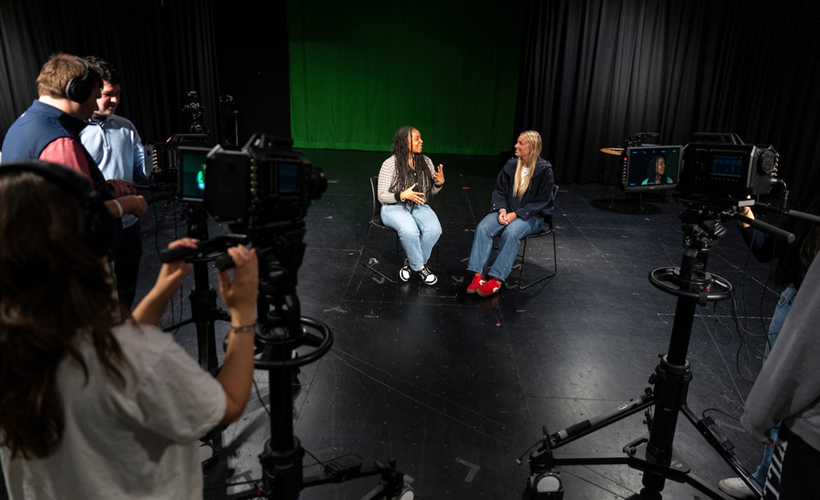MAJOR IN COMMUNICATION
The Communication Department at Villanova has a cutting-edge undergraduate major curriculum, which—reflecting our Department's mission—integrates the theory, research, and practice of communication. The degree comprises introductory courses, theory courses, advanced topics courses, an advanced research course and one integrative, capstone course.

EXPLORE THE MAJOR
Concentrations
The Communication major gives you the flexibility to choose how you want to package your courses within the Department. The Department offers eight concentrations, allowing students to focus their education on their area of interest, or students may choose to design their own concentration. Each concentration has specific requirements within the department's theory courses and advanced topic courses. Some concentrations require an internship.
Interpersonal and Intercultural Communication studies role of communication in the formation and negotiation of intimate relationships, families, and friendships. This specialization is great if you're interested in conflict mediation, counseling, intercultural training, or communication consulting.
Area Coordinator: Qi Schlupp, PhD
Journalism studies creation and framing of news in print, electronic, and broadcast media. This gives you a great background for a career as a sportswriter, newscaster, photojournalist, or e-journalist!
After completing your introductory courses in the major, you will choose from a series of theory courses that begin to build the foundation for your courses in journalism. At the advanced level, you will take Introduction to Journalism, which offers a broad survey of the field. This is the prerequisite for specialized topical and skills courses such as Broadcast Journalism, Multimedia Journalism, Sports Journalism, Journalism Practices, and Feature Writing. These advanced courses offer more focused coverage and allow you to customize your curriculum to your personal interests. You are also required to take at least one Media Production course and another from a different area.
This specialization requires a journalism internship.
Area Coordinator: Michael Bradley, MA
Media Production studies design, production, and editing of content for television, film/video, audio, radio, and multimedia contexts. This is a perfect specialization for a career in audio production or sound recording, radio and internet radio broadcasting, television production, video editing and production, and multimedia production.
This specialization requires a production internship.
Area coordinator: Hezekiah Lewis, MFA
Media Studies analyzes mass mediated content (film, television, new media), media technology, media audiences, and mass media as an industry. This is an ideal major if you're interested in entering film school, the film industry, or if you're interested in the study, criticism, and public policy related to the mass media (film, television, internet, etc.).
Area coordinator: Susan Mackey-Kallis, PhD
Organizational Communication studies communication as organizing process, as well as its role in creating identities, relationships, discourses, and cultures within organizations. This is a perfect track for a career in corporate training and development, corporate or international negotiations, human relations/resources, communication management, or organizational consulting.
Area Coordinator: Dron Mandhana, PhD
Performance Studies views performance as a fundamental part of the way human beings communicate, both on and off the stage. Performance Studies is one of the oldest areas of study in Communication as it focuses on the creation, structure, style, impact, politics, and poetics of performance. Examining the cultural, aesthetic, and rhetorical underpinnings of texts and bodies in and through performance, performance studies puts the body front and center as a key to unlocking self, identity and the power of communication. Performance both on and off the stage invites dialogue and has the power to propel us into understanding disparate experience.
In this specialization we analyze performance, and we do performance. You will study public, cultural, aesthetic, and literary performance; study performance as advocacy and embodiment; and develop individual artistic and critical skills as you create, adapt, perform, and direct your own work. This specialization is perfect if you are interested in acting, directing, literature, or performance art; it is ideal for any career that involves public presentations, persuasion, creativity, and/or advocacy.
Area Coordinator: Evan Schares, PhD
Public Relations and Advertising studies image creation and maintenance, media relations, strategic campaign planning and implementation, and crisis communication. This is perfect if you're interested in a career in any area of public relations, marketing, advertising, or integrated communication.
This specialization requires a public relations and advertising internship, and students must join the Public Relations Student Society of America.
Area Coordinator: William Cowen, EdD
Rhetorical Studies engages questions of public meaning, important definitions and issues that matter—legally, politically, and socially. We prepare you to understand and intervene in the daily struggle over social meanings, the process by which these meanings are created, reinforced, and resisted through symbols, material spaces, and visual images.
A rhetorical education is a crucial part of the liberal arts trivium and has long been understood as crucial to democratic participation because of the skills it offers in advocacy, as well as in critical analysis of political symbols and their influences. Through the use of critical and interpretive methods, rhetorical studies focuses on how communication comes to have meanings for audiences. This is an ideal pre-law major or a strong preparation for careers in advocacy, politics, or social justice work.
Area Coordinator: Billie Murray, PhD
Option 1: Design your own Concentration
You can choose to design your own Communication degree very easily. In addition to fulfilling the Communication Department's basic degree requirements, you may choose two 2000-level courses to fulfill your theory requirement, and any six 3000-level courses, from at least three different specializations. Mix and match your 2000- and 3000-level courses to best fit your post-Villanova plans!
Option 2: Specialize your COM Major
Many of our students find that they prefer to specialize in one—or more—area of the field of Communication. In order to facilitate this process, our Department has created 8 different concentrations, which lead to a variety of Communication careers and graduate or advanced study.
When you choose a concentration within the major, you typically do NOT add additional classes beyond the basic major requirements (with the possible exception of internships). Instead, you simply select the specified package of courses that best fits your Communication interests.
Your COM 1000 course, and your academic advisor, will help you select which of these paths of study seems best suited to you!

“The Communication program at Villanova allows you to discover and follow your passions while preparing for life outside of Villanova, wherever it may lead you. Personally, I have always had a deep appreciation for the arts, especially theater and music. From studying performance abroad in Greece to framing final projects around iconic RnB and Hip-Hop albums, I was able to weave my passions into my studies in ways that felt very personal and meaningful."
– Sabrina Carter ’18 CLAS

